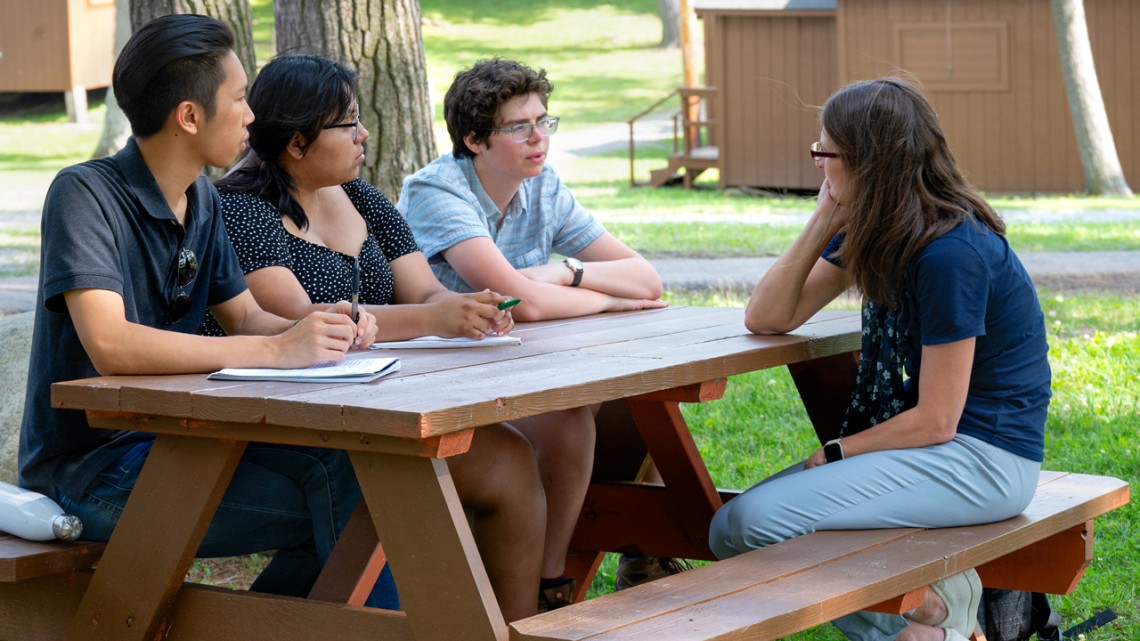
Student interns, from left, Russell Kwong, Sherla Zhagnay and Chet Lukanic speak with Sage Gerling, CCE Ontario County board member and associate director for business operations at the Cornell Agritech.
Student interns help plan future of 4-H camp
By Jackie Swift
Thirty years ago, Cornell Cooperative Extension (CCE) of Ontario County received a gift of 85 acres of land to be used for its 4-H Camp Bristol Hills in Canandaigua, New York. Today the land is partially developed, but CCE and 4-H Camp leaders have long wanted to develop it further to benefit as many people as possible.
Three undergraduates majoring in urban and regional planning have helped make that vision a reality, through the CCE Summer Internship Program.
“We created a land-use plan for how best to develop the property so it can serve the needs and wants of both the community and the 4-H camp,” said Eliza Blood, M.R.P. ’24, a master of regional planning student and the project manager working with the undergraduate interns.
CCE and 4-H Camp leaders realized they needed a land-use plan a few years ago, when the Department of Health required the camp to place its new septic system on the undeveloped land. “By not having a land-use plan, we had put ourselves in a situation where we had limited our options,” said Jim Hooper, 4-H Camp Bristol Hills manager. “Before we do any more development on the land, we want to make sure that we know our long-range plan.”
So Tim Davis, CCE Ontario County executive director, reached out to Cornell, and three undergraduates from the College of Architecture, Art and Planning’s Department of City and Regional Planning spent this summer helping to get the project underway.
First the interns gathered opinions about the land development from stakeholders and the general public. “We interviewed 4-H Board members, campers and staff,” said Russell Kwong ’25, who worked with fellow interns Sherla Zhagnay ’25 and Chet Lukanic ’25 on the project. “We talked to town supervisors and others in the community. We also interviewed Indigenous people in the area to understand what the land means to them historically and to ensure that any use of the land is aligning with and paying respect to their culture.”
In addition, Kwong used geographic information system software to map and design the site.
In their final report, the interns outlined the land’s history, drawbacks to development and the feasibility of potential use by the 4-H camp. The report highlights the community’s strong desire to include water sports in the camp offerings, as well as the need to bring in more revenue to the camp through year-round use. The report also breaks down the overall development project into three phases, meant to help guide the process over time.
CCE will use the report to generate excitement and support in the community for the development, said Davis. The camp already has a good working relationship with the local and county highway departments, for instance, but Davis hopes having a long-range plan will bolster CCE’s requests for assistance.
“If we show them this plan that outlines what we want to do in the long term, that will generate support for the work – not only from the highway departments, but from the local college and volunteer groups, too,” he said.
Cornell students will continue to support the 4-H Camp Bristol project over time, through community-engaged learning classes, research projects and student group engagement.
The CCE Summer Internship Program started 16 years ago in partnership with the College of Agriculture and Life Sciences and the College of Human Ecology. Today, it is open to students from all colleges at Cornell, with support from the David M. Einhorn Center for Community Engagement. Students participate in CCE county offices and Cornell research facilities around New York state.
“I took this internship to get my feet wet [in regional planning],” said Kwong. “But I know wherever my career ends up in the future, I want to continue working with communities like I did here, working on policies that help overall community health. It’s been an awesome experience.”
Jackie Swift is a freelance writer for the Einhorn Center for Community Engagement.
Media Contact
Get Cornell news delivered right to your inbox.
Subscribe

